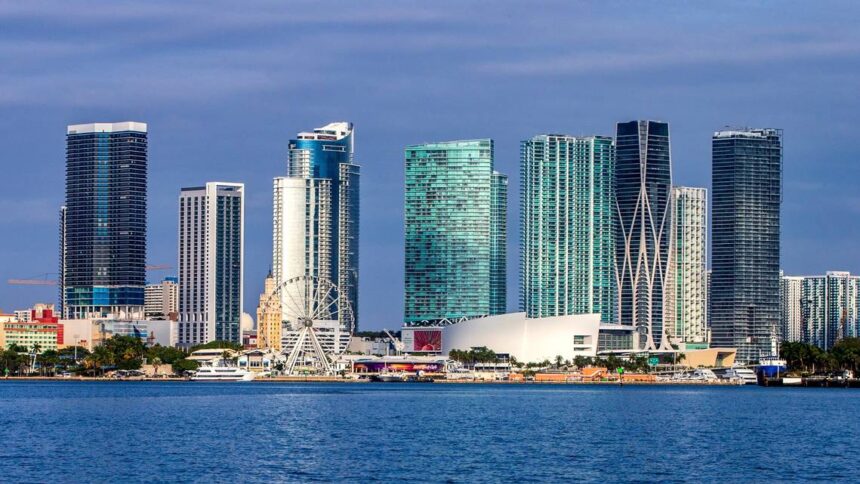Miami skyline, including Bayside Marketplace, Freedom Tower and the Miami Heat arena.
pportal@miamiherald.com
Deep-pocketed buyers came back to South Florida in April after a slowdown in residential transactions since December.
Miami-Dade County had 2,342 home sales, up by 5.4% from April 2023, according to the latest monthly housing report from the Miami Association of Realtors. Broward saw even more activity — a total of 2,538 residential deals, up 6.1%.
South Florida’s housing market defies even national trends. The number of single-family homes and condos fell by close to 2% nationwide, according to the National Association of Realtors.
South Florida’s slowing housing activity got into higher gear in April for the first time this year. January and February saw barely a 1% increase in year-over-year home deals, and March saw a double-digit drop, which real estate analysts blamed on interest rates and concerns about the economy.
The crop of buyers shopping for homes today don’t seem concerned about historically high sales prices as they scoop up some of the priciest homes on the market — so much so that home values have reached new levels in pockets of Coral Gables and Miami Beach.
Median sales prices reached a new high of $654,000 in Miami-Dade County for single-family homes, surpassing the last price peak in February and March of $650,000. Condos hover at $444,000.
Broward County experienced similar activity, with a median sales price of $635,000 — the highest for this year so far — and $282,500 for condos.
“It is a sellers’ market if prices keep going up and inventory stays low. In other markets that’s starting to turn where it goes from a sellers’ market to a buyers’ market. In Miami, we’re not there yet,” said Jason Damm, assistant professor of professional practice in finance at the University of Miami. “That’s just indicative of high demand in the market.”
Demand, Damm added, has largely been driven by billionaires — Citadel CEO Ken Griffin, Amazon Founder Jeff Bezos — and people in their industry following their lead to move to South Florida.
Short supply of homes in Miami and Broward
South Florida lacks enough single-family homes and condos to meet demand.
A balanced market consists of six to nine months of inventory, with anything less favoring sellers and anything more benefiting buyers during negotiations. At this time, Miami-Dade has 4.4 months of houses and 8.3 months of condos. Broward has 4 months of houses and 7.4 months of condos.
But there’s still good news for buyers — inventory is much higher today compared to a year ago. In April 2023, Miami-Dade had 3.3 months worth of houses and 4.9 months of condos. Broward had 2.5 months of houses and 3.3 months of condos.
“Inventory is starting to go up. Usually when you see that then you’ll see some trailing prices,” said Jack McCabe, owner of the Deerfield Beach-based real estate and economic research firm Jack McCabe Expert Services. For now, McCabe said, “you still have strong demand, limited supply and affluent buyers. It doesn’t bother them to pay three or four million if where they are coming from it’s five or six million. The homes here and sunshine are worth it.”
Nearly half of those buying do so with cash. Miami-Dade saw 40.3% of its transactions close with dinero, and Broward saw 41.5%. Both percentages were much higher than the 28% national average.
Confidence in the South Florida real estate market
Seeing the resilience and steady demand for South Florida housing, real estate developer Ellen Buckley felt confident about opening her own firm in January 2023 after working for nearly a decade with Terra. In addition to the desire to lead her own firm, Buckley, founder and CEO of Prospera Real Estate, said she noticed a new level of wealth and interest in Miami.
“Prior to the pandemic, I haven’t seen this level of investment in South Florida,” Buckley said, “People are going to college at Columbia and making an intention to work in Miami. It has flipped in terms of the desire to live and work here.”
Prospera Real Estate has a handful of developments in the pipeline in South Florida, primarily in Coconut Grove, Miami Beach and North Miami. In addition to planning for luxury high-rises, Buckley wants to take advantage of the Live Local Act — a slice of Florida legislation designed to entice more developers to build affordable and workforce housing communities with tax incentives and funding.
“In order to have a vibrant economy,” Buckley said, “we need to feed every level.”











